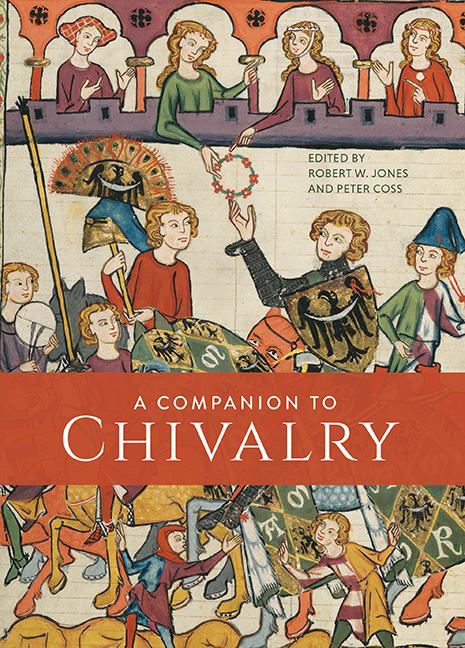Book contents
- Frontmatter
- Contents
- List of Illustrations
- List of Contributors
- Introduction
- 1 The Origins and Diffusion of Chivalry
- 2 The Organisation of Chivalric Society
- 3 The Secular Orders: Chivalry in the Service of the State
- 4 The Military Orders
- 5 Marshalling the Chivalric Elite for War
- 6 Chivalric Violence
- 7 Chivalry in the Tournament and Pas d'Armes
- 8 Heraldry and Heralds
- 9 Arms and Armour
- 10 Constructing Chivalric Landscapes: Aristocratic Spaces Between Image and Reality
- 11 Gendered Chivalry
- 12 Chivalric Literature
- 13 Manuals of Warfare and Chivalry
- 14 The End of Chivalry? Survivals and Revivals of the Tudor Age
- 15 Chivalric Medievalism
- Select Bibliography
- Acknowledgements
- Index
13 - Manuals of Warfare and Chivalry
Published online by Cambridge University Press: 24 October 2019
- Frontmatter
- Contents
- List of Illustrations
- List of Contributors
- Introduction
- 1 The Origins and Diffusion of Chivalry
- 2 The Organisation of Chivalric Society
- 3 The Secular Orders: Chivalry in the Service of the State
- 4 The Military Orders
- 5 Marshalling the Chivalric Elite for War
- 6 Chivalric Violence
- 7 Chivalry in the Tournament and Pas d'Armes
- 8 Heraldry and Heralds
- 9 Arms and Armour
- 10 Constructing Chivalric Landscapes: Aristocratic Spaces Between Image and Reality
- 11 Gendered Chivalry
- 12 Chivalric Literature
- 13 Manuals of Warfare and Chivalry
- 14 The End of Chivalry? Survivals and Revivals of the Tudor Age
- 15 Chivalric Medievalism
- Select Bibliography
- Acknowledgements
- Index
Summary
In an era when the social elite had both rights and obligations as regards the use of violence, it was natural that there was a great deal of interest in how these should be conducted. Rights included the opportunity to pursue disputes through the mechanism of feud as a form of legal judgement; obligations involved military service to a superior individual who might, or might not, represent an actor in what in modern terms would be considered the organisation and direction of violence as a tool of the state. Since medieval states were mostly centred on monarchy and personal rule, the lines between this and any abstract sense of the state were inevitably blurred. Above all was the concept of the Christian God as the final arbiter in all terrestrial disputes, to whom warriors owed both their status and their duty to behave in an appropriate manner on the field of battle and in wider aspects of military conflict.
Although it is obvious to a modern reader that in order to learn how to do something one should consult a manual, when it comes to appreciating the social aspects of learning – imitation and emulation – these are is still acquired by working alongside expert practitioners. In the medieval centuries this factor was considerably emphasised. Having said that, there was indeed a literary tradition concerning instruction in military affairs. By the later middle ages the trickle of information available for serious military education had almost become a flood, with a much wider distribution of ideas made possible by the invention of printing. This chapter will consider a range of such texts, some of which are recognisably instructive and directive in nature and others which are part of a much wider social context: tales of heroes in both poetry and prose, mostly in the vernacular, but also in the ‘official’ languages of the Latin West and the Greek East. Although there are parallel texts in Arabic and other languages, it falls outside the scope of this study to include them.
The single most important name for understanding this topic is that of Flavius Vegetius Renatus, an obscure late Roman official of the early fifth century who wrote a short text on the practice of warfare and the reform of the imperial military.
- Type
- Chapter
- Information
- A Companion to Chivalry , pp. 263 - 280Publisher: Boydell & BrewerPrint publication year: 2019



